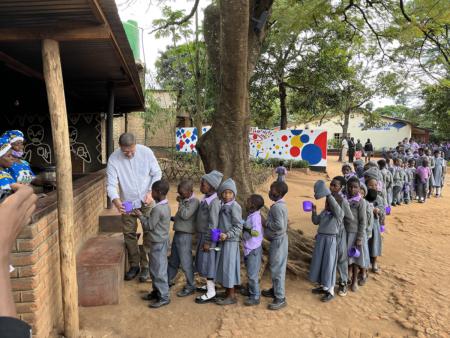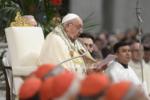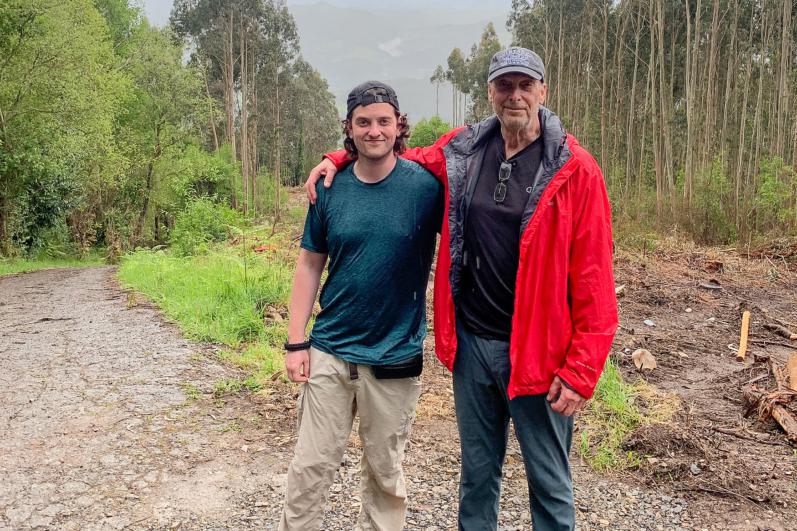UMass Lowell chaplain, son encounter blisters, blessings on Camino de Santiago
BRAINTREE -- In 2017, the first time Deacon Michael Mott embarked on the famed Camino de Santiago pilgrimage route, he had a strict routine.
Each morning along the French Way, a 500-mile route beginning at Saint-Jean-Pied-de-Port in France and ending at Santiago de Compostela in Spain, the UMass Lowell chaplain would get up at 4:30 a.m. to pray. He tried to hit the trail at 5:15 a.m., before the sun rose at 7 a.m. His average speed was three miles per hour, averaging over 18 miles each day. He would hike until 9 a.m. before stopping at a village cafe for breakfast. He would drink two glasses of Coca-Cola and eat a chocolate croissant for energy, then hike until noon or 1 p.m. and stop for lunch, washing it down with another Coke. (Deacon Mott can't stand Coca-Cola, but it gave him the energy he needed.) After lunch, he kept hiking. At some point between 2 p.m. and 4 p.m., he would stop hiking to physically and mentally prepare for the next day. He always made sure to be in bed by 9 p.m., the time that many people in France and Spain are just sitting down for dinner.
Much of Deacon Mott's time on the Camino was spent in silent contemplation, thinking about his goals and reflecting on his past.
"The time to just get to know yourself is the best," he told The Pilot in a July 26 interview. "Without interruption. You know what you're doing, so even if you're walking with somebody, you're probably only spending 15-20 percent of the time talking."
On the final two days of the pilgrimage, he walked for over 25 miles, starting at 4 a.m. He wanted the last stretch to be "penitential." It was late afternoon when he saw Santiago and its magnificent cathedral.
"It was like winning the lottery, standing in front of St. James," he said. "There's no better feeling that you can have in an emotional or spiritual context . . . I thought it was the best adult adventure that you could possibly have."
On the Camino, Deacon Mott made lasting friendships. He walked alongside people from as far away as Australia, and still keeps in touch with them to this day. However, something was missing. Deacon Mott had invited his son, Casey, who was then in college, to come with him, but Casey refused. The deacon didn't take it personally, but Casey almost immediately regretted his decision.
"I figured that if I ever got the chance to do it with him again, I'd have to say yes," Casey, now 27, told The Pilot in a July 29 interview.
In 2024, a second chance came. From April 27 to May 19, Pentecost Sunday, father and son walked 300 miles together from the Spanish city of Santander to Santiago. Casey, a history major, was excited to see the sites he had studied -- and spend some one-on-one time with his dad. Deacon Mott wanted to relive the "life-altering experience" of the Camino with his son while celebrating a personal milestone -- his 75th birthday.
"I believe the more active you are, the better you are," the deacon said. "Physically, I'm still capable and in shape to do it."
Many people go on the Camino for secular reasons, but for the Motts, it was a pilgrimage first and foremost. The two would pray the rosary together every morning as they set out. When they were done praying, they had already covered a mile. Along the way, the two men talked about things they never had the chance to talk about before, because they were embarrassed, guilty, or ashamed to bring them up.
"It was very understanding," Casey said. "It came from a place of non-judgment. I think we both understand each other a lot more now. I think we both understand that we're both not perfect and we make mistakes, but we still love each other very much and we still love our family very much."
Casey, who Deacon Mott described as quiet, had time to reflect on his life and open up about his feelings. About a third of the way through the Camino, Deacon Mott said, father and son had "a heart-to-heart conversation" about Casey's past and his regrets.
"That, I think, was a big revelation for him, and that was a big revelation for me too," Deacon Mott said.
He added that the Camino gave his son "the grace to go inside himself and examine himself."
"You always have to give God the credit," he said.
For Casey, the conversations with his dad were the most memorable part of the Camino -- and the time they reached the summit of a steep 4,600-foot mountain, their bags laden with supplies.
"Surprisingly, over the course of 24 days, we didn't run out of things to talk about," Casey said.
For his first Camino, Deacon Mott prepared by going for six-mile hikes in hilly terrain, while carrying a 20-pound backpack. For his second, he would row three miles in a rowing machine before work each day, and Casey would walk 10 miles on the treadmill at the gym. For both men, the training wasn't enough.
"You're never prepared," Deacon Mott said. "Whatever you do, it's never enough. The amount of punishment you put your body through, especially your feet and legs, is just something."
It takes at least a week, he said, to "get into Camino form" and navigate the constant uphill and downhill hiking. When he walked with his son, it took him eight or nine days.
"Great way to lose weight, though," he said.
"It was tremendously difficult, especially the first five or six days," Casey said. "Your feet just get covered in blisters."
Blisters are inevitable on the Camino. Deacon Mott had to rest a few days to allow them to heal, especially a "particularly heinous" one on the ball of his foot.
"You learn a lot about yourself and pain and stuff like that," Deacon Mott said.
Casey spent a lot of time on his own, navigating the trail while his father healed his blisters. He also had to help his father caring for the "heinous" blister.
"Having my son reverse roles, I think that was a wonderful and unexpected gift," Deacon Mott said, "to be the recipient rather than the one always doing the tending."
Father and son agreed that walking on blisters was agonizing, but after the first mile, the feet become so numb that the pain disappears.
"It motivates you to keep moving so you can get the day over and put your feet up," Casey said.
A few days' distance outside of Santiago, two pilgrimage routes -- the Northern Way and the French Way -- converge. There was a large confluence of pilgrims, and as Deacon Mott and Casey were praying the rosary, they met a woman from Mexico who joined them in prayer. Two other young women from South America also asked to join them.
"We became a little community praying the rosary on our way to Santiago," Deacon Mott said.
When they finally reached the hill overlooking the city, Casey cried. He was "overcome with joy."
"It was mostly surreal," he said. "I couldn't believe it was happening until it was really happening, but it was amazing seeing the dedication these people had with no technology, building these massive monuments to God."
"There are very few feelings in life that are as good as accomplishing something that is very difficult, very hard," Deacon Mott said, "and something that you accomplish to the best of your ability, and that you accomplish with somebody that you love."
Deacon Mott expected this to be the last time he walked the Camino until his wife Karen told him that she'd like to walk the Portuguese way someday.
"But that's only 120 miles," Deacon Mott said. "It's a piece of cake."



















